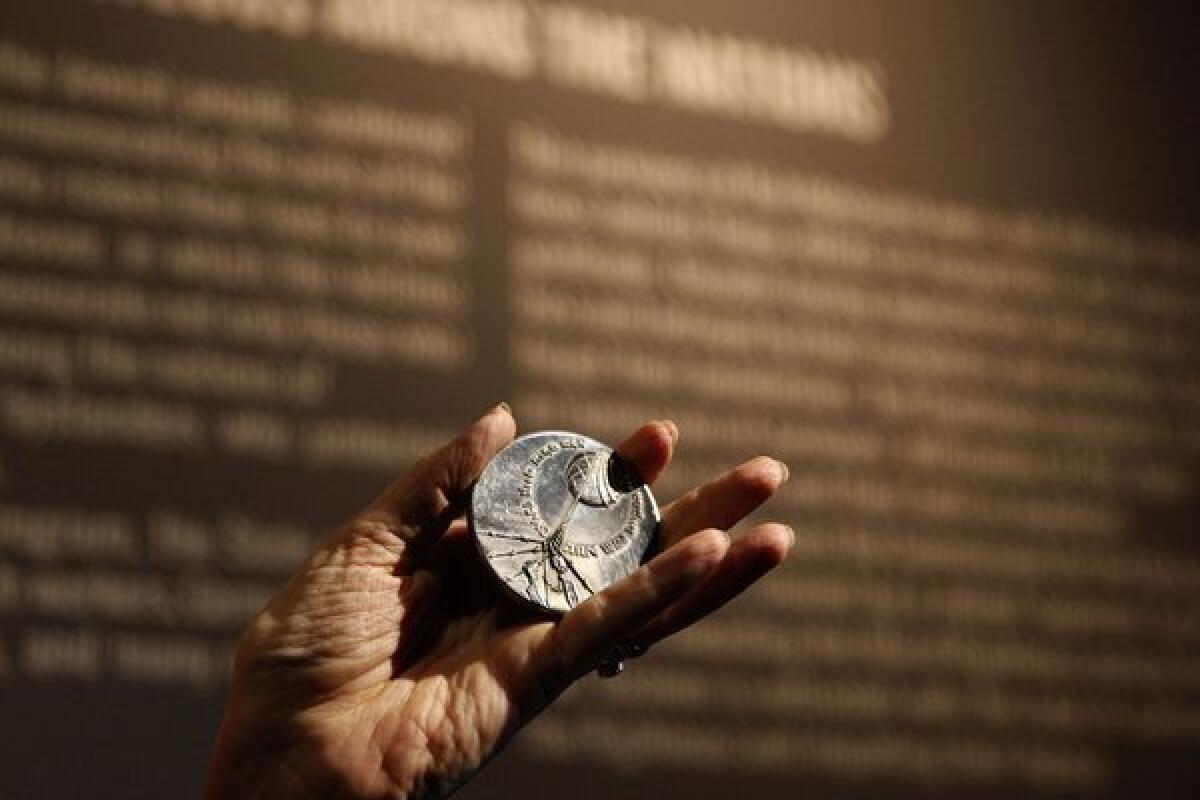Egyptian hero’s kin reject honor by Israel’s Holocaust museum

- Share via
CAIRO — It could have been a story of reconciliation and redemption, inspired by a long-ago act of courage and kindness. Instead, it turned into an illustration of the stark realities of the modern-day Middle East.
Yad Vashem, Israel’s Holocaust memorial, has posthumously honored an Egyptian doctor who risked his life to save Jews in Berlin during World War II — the first Arab ever to receive such recognition. But a surviving family member spurned the award, a news agency reported Sunday, citing the enmity between Egypt and Israel.
The man whose deeds were commemorated last month with Yad Vashem’s highest honor for a non-Jew, naming him as a “righteous among the nations,” was Mohamed Helmy, who was a young medical student in Berlin as Hitler began his inexorable march to power.
Born in what is now Sudan to Egyptian parents, Helmy himself was singled out by the Nazis as insufficiently Aryan, a designation which led to his dismissal from a state medical institute and prevented him from marrying his German fiancée, according to Yad Vashem’s records. In 1939, he was even arrested along with other Egyptians living in Germany but managed to win his release.
Despite his own peril, Helmy stepped up when a desperate Jewish friend turned to him for help in escaping deportation and near-certain death. He hid the young woman, Anna Boros, helping her and other family members find shelter in a series of safe houses and a cottage he owned in a quiet northeastern suburb of Berlin.
“The Gestapo knew that Dr. Helmy was our family physician, and they knew that he owned a cabin.... He managed to evade all their interrogations,” Boros, later Gutman, wrote after the war, according to Yad Vashem’s citation. “Dr. Helmy did everything for me out of the generosity of his heart, and I will be grateful to him for eternity.”
At one heart-stopping turn in the saga, relatives of Boros who were caught by the Nazis admitted under interrogation that Helmy had helped them. But he managed to trick the police, through a fake letter from Anna, into believing that she had fled to another part of the country.
Helmy, who died in 1982, stayed on in Germany after the war with his fiancée, whom he was then able to marry. His Egyptian relatives sometimes visited, including a great-nephew and his wife, who was located and identified by the Associated Press as Mervat Hassan, 66.
The Cairo family’s reaction to his honor was a reminder that the peace between Egypt and Israel is a cold one, although the treaty between the two countries has endured for more than three decades. “If any other country offered to honor Helmy, we would have been happy with it,” Hassan told the news agency.
Despite the distaste with which many Egyptians view Israel, the countries’ interests sometimes coincide. Israel welcomed the overthrow of Islamist President Mohamed Morsi in a July coup, and has been relieved to see Egyptian troops taking on Islamist militants who had ensconced themselves in the Sinai peninsula during Morsi’s short-lived tenure.
Yad Vashem is searching for other relatives of Helmy, who had no children, to try to find any willing to accept the award citation, memorial officials said.
“We regret that political sentiment seems to have overcome the human aspect, and hope one day that the latter will prevail,” Yad Vashem said in a statement Sunday.
Hassan characterized the family’s position as rooted in the hostility that exists at the national level, not personal animus. “I respect Judaism as a religion, and I respect Jews,” she told the Associated Press. Efforts to reach her independently were unsuccessful.
Egypt was once home to a thriving Jewish community whose members played important roles in culture and commerce alike. But most were forced out in the 1950s and 1960s, and their property confiscated. Their numbers are now minuscule, and remaining Jewish sites, including historic synagogues, are for the most part abandoned.
Yad Vashem’s drive to honor non-Jews who tried to help Jewish friends, neighbors and strangers as the Holocaust took hold began in 1963, and over five decades, the “righteous among the nations” project has unearthed thousands of stories from all walks of life. Although other Arabs have been nominated for recognition, Yad Vashem confirmed that Helmy was the first to be honored.
“In a world of total moral collapse, there was a small minority who mustered extraordinary courage to uphold human values,” the memorial says on its website. “Bystanders were the rule; rescuers were the exception.”
ALSO:
U.N. official urges access to besieged Syria civilians
Peru vows to investigate report of massive dolphin slaughter
Mexico cartel honcho reportedly killed by gunmen dressed as clowns
Staff writer King reported from Cairo. Sobelman, a Times news assistant, reported from Jerusalem.
More to Read
Sign up for Essential California
The most important California stories and recommendations in your inbox every morning.
You may occasionally receive promotional content from the Los Angeles Times.










